Sedation Dentistry – Chesterfield, MO
Helping Kids Feel Calm In The Treatment Chair
Dental anxiety is a common issue for many people, let alone little kids. It wouldn’t be surprising if your child is scared to see dentists and get proper smile care. Thankfully, there’s good news – we at Dr. Sedighi’s office provide pediatric sedation dentistry in Chesterfield. Our team will gladly work with your children to make their treatment nice and relaxing. To learn more, just keep reading or book an appointment for your kiddo today!

Why Choose Homer Sedighi, D.M.D for Sedation Dentistry?
- Fully-Licensed Pediatric Dentist
- Friendly & Understanding Dental Staff
- Fast-Acting Nitrous Oxide Sedation
Nitrous Oxide Sedation
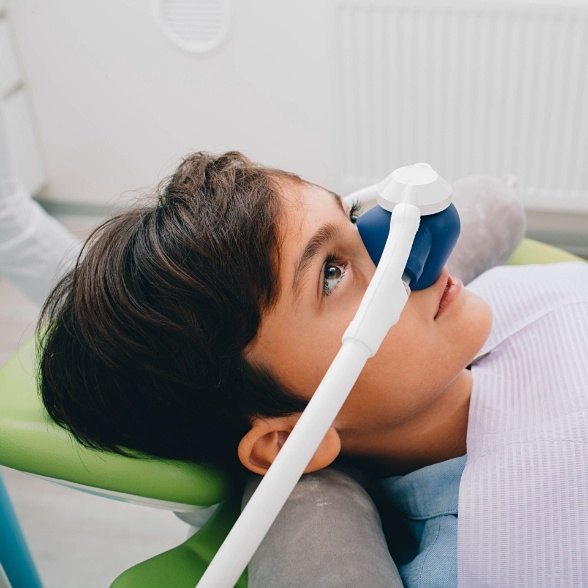
If your child only has mild dental anxiety, they’d likely benefit from our nitrous oxide sedation. This option would have them inhale nitrous oxide through a small and helpful nose mask. Within a few minutes, the “laughing gas” should calm your little one and make them feel quite relaxed. Our team will then work quickly and effectively to improve their teeth and gums! You can also rest easy – the nitrous oxide gas will wear off right after treatment.
Is Your Child a Good Candidate for Nitrous Oxide?
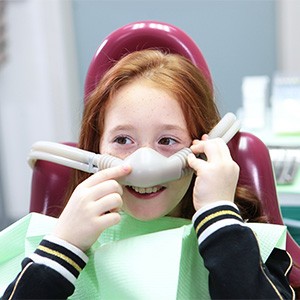
Compared to other dental sedatives, nitrous oxide is pretty mild. That means it’s well-suited for child patients with one (or more) of the following:
- Mild-to-moderate dental fears or anxieties
- A strong gag reflex
- Persistent tooth sensitivity
- Struggles with holding the jaw open
- Jaw, neck, or back pain from sitting in the examination chair.
- An inability to still for long periods
Of course, you should consult Dr. Sedighi before opting for nitrous oxide. He’ll review your child’s medical history to confirm the sedative won’t have harmful side effects.
How Does Nitrous Oxide Work?
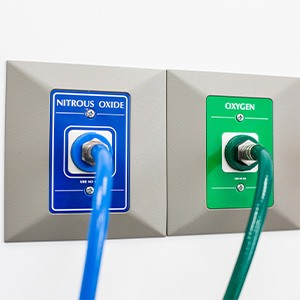
It’s rather simple to use nitrous oxide in dental work. For that reason, your child will find that it makes their treatment a much smoother experience.
Here at our office, we apply nitrous oxide through a small nose mask. Your child will inhale a steady stream of this “laughing gas” before and during the treatment process. A few minutes after they start, they’ll feel more relaxed, euphoric, and even giddy. Any anxiety they have will melt away until they’re comfortable and completely at ease about their dental care. Still, they’ll be alert enough to respond to our team’s instructions.
We’ll continually monitor your child while they’re “under” nitrous oxide’s effects. That way, we can adjust the gas as needed to ensure safe treatment. Our office won’t put your youngster in harm’s way.
Aftercare for Nitrous Oxide
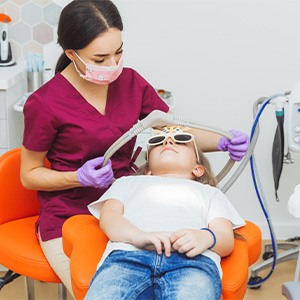
Nitrous oxide doesn’t demadn much in the way of aftercare. One of its biggest perks is that its effects quickly fade once the gas is removed. Given that fact, your child should feel fine just a few minutes after their treatment ends. They’ll likely be ready and raring to go right away!
All that said, some patients can feel a bit nauseous after a nitrous oxide session. It’d be best for your child to have only a light meal before their treatment. Otherwise, they may get sick or have an upset stomach afterward.
IV Sedation

IV sedation is meant for kids who are especially young or fearful or who have special needs. Unlike nitrous oxide, it applies a sedative intravenously and delivers a deeper level of calm. The result is that this option calms even the most anxious children and makes dental care easy. Dr. Sedighi also has the knowledge and skill to perform it in a safe and secure environment. To that extent, you can trust our IV sedation to work wonders for your son or daughter.
What is IV Sedation?

IV sedation is a service that applies sedatives directly into the bloodstream. Its effects thus tend to “kick in” rather quickly, putting patients in a very deep state of relaxation. However, the IV process will leave your child conscious throughout the procedure; they just won’t remember much (if anything) from the experience.
When we administer IV sedation, our team will monitor your child’s vitals to ensure everything goes smoothly. You can trust your little one to feel refreshed and rejuvenated after the treatment. That’s something our practice takes great pride in!
Is Your Child a Good Candidate for IV Sedation?
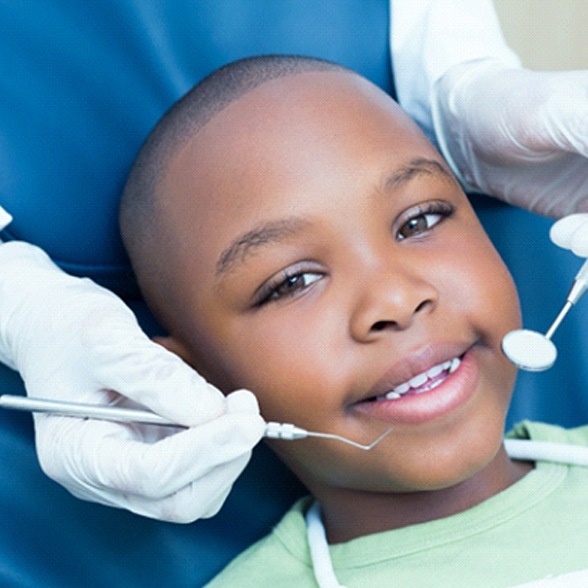
While not every kid is eligible for IV sedation, most can take advantage of this safe and effective method. Our team will gladly evaluate your child’s background (past experiences, temperament, dental trauma, etc.) to see if they’re a good candidate. Once we have, we’ll tailor their treatment plan accordingly and take the proper steps.
Of course, a child can show signs that IV sedation is right for them. The most common of these include:
- An inability to sit still
- A severe gag reflex
- Intense anxiety or fear towards dentists
- Special needs
The Benefits of IV Sedation
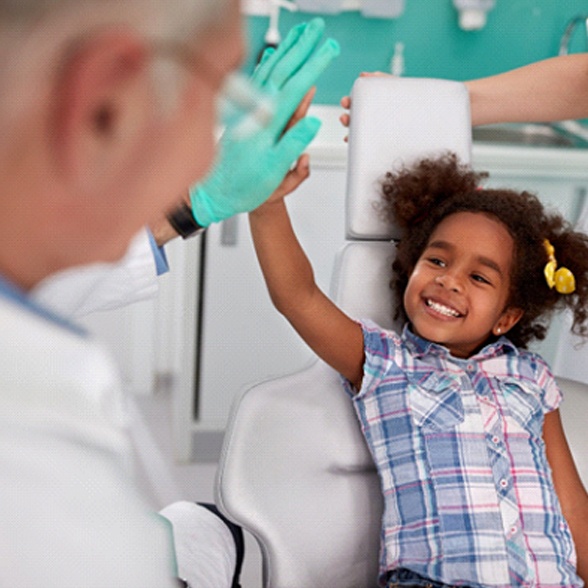
Rest assured – it’s incredibly common for children to feel nervous about visiting their dentist. If your little one needs help relaxing, IV sedation is an excellent option to consider. It offers several incredible benefits, such as:
- Fast-Acting Care: Shortly after administering the sedative, your child will quickly feel calm and relaxed.
- A Pain-Free Experience: While under IV sedation, your child won’t feel any pain whatsoever. That’s extremely comforting, especially for those with a fear of needles.
- Less Long-Term Anxiety: As long as your child has one good experience, they’ll feel better about visiting their dentist in the future.
- Limited Memory of Treatment: Most patients remember very little about the procedure, which helps prevent more traumatizing dental memories.
Sedation Dentistry FAQs
Is Sedation Dentistry Safe for Kids?
Sedation dentistry can often be uniquely useful for children, as they tend to be disproportionately fearful of the dentist. If you’re interested in helping your child relax at their appointment, you’ll be happy to hear that when administered by a trained professional these sedatives are completely safe.
Nitrous oxide is one of the milder sedatives and its dosage is easily controlled by us throughout the procedure, making is an excellent option for younger patients. The only risk is some mild nausea after the treatment is complete, so it may be a good idea to limit what your child eats before receiving the sedation.
What Does it Feel Like to Be Sedated?
The way your child will feel will obviously depend on the sedative they’re using. While all of them are good at putting children at ease and helping them to relax, the actual sensation of each sedative is slightly different.
Nitrous oxide tends to make people feel light and giggly, as you’d expect from something called “laughing gas.” IV sedation, on the other hand, tends to make patients feel heavy, and can even cause them to nod off during the procedure.
How Long Does Dental Sedation Last?
As you can imagine, the amount of time you can expect the dental sedatives to affect you depends on which one your child is using. In the case of nitrous oxide, feelings of sedation should wear off entirely within minutes of the flow of gas stopping. The effects of IV sedation should also fade fairly quickly, though it’s common for patients to feel groggy for the rest of the day after the treatment is completed.
Who is a Good Candidate for Sedation?
Sedation is often advertised to those patients who have trouble making their way to the dentist’s office due to anxiety, allowing them to relax for the duration of their appointment. However, there are other reasons why they’re useful, like in helping disabled patients stay calm during treatment or to suppress gag reflexes that make care otherwise difficult.
Sedatives are safe for most patients, which means that just about anyone who wants them can make use of them. There are, however, some medications that can make this a problem, so it’s important to review your child’s medical history if they’re receiving sedation.